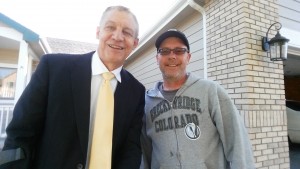Run-aways Who Returned
 I had another busy day today. This morning, I had a radio interview (via phone) about the upcoming National Day of Prayer, followed by my weekly conference call with my energy partners team. After my chiropractor appointment, I attended the Prime-Time lunch at church and then headed to Loveland for a National Day of Prayer planning committee meeting. I have a meeting tonight….if I decide to go.
I had another busy day today. This morning, I had a radio interview (via phone) about the upcoming National Day of Prayer, followed by my weekly conference call with my energy partners team. After my chiropractor appointment, I attended the Prime-Time lunch at church and then headed to Loveland for a National Day of Prayer planning committee meeting. I have a meeting tonight….if I decide to go.
The weather forecast for this weekend is for a heavy spring snow. I’m glad we have all of our drainage issues resolved around the house. Our basement should be protected from water leaks. Bill Nation completed the work in front of our house. Bill was my respiratory therapist at Northern Colorado Rehab Hospital during my two month stay. His favorite Bible verse is Psalm 18:2. He carries it with him on a 3×5 card, “The Lord is my rock, my fortress, and my deliverer, my God, my mountain where I seek refuge, my shield and the horn of my salvation,my stronghold.”
BIBLE VERSE FOR TODAY…. “…Bring Mark with you, for he is useful to me in the ministry.” 2 Timothy 4:11 HCSB
In the last few days I read the Book of Jonah (in the Old Testament) and the Book of Philemon (in the New Testament). As I reflected on some of my recent encounters with scripture, I began to think about “run-aways” that returned. Each is different, each became a “run-away” in their own way.
Jonah, the prophet was called by God to do God’s work and to speak God’s word. But when the Lord’s instruction ran contrary to his view of Israel’s enemies, and his own desires, he ran way from the call of God.
One of the most troubling statistic is the number of ministers and pastors who leave “the ministry.” The reasons are as different and as unique as the individuals but some similarities have been noted. One article noted that the list of common reasons include, discouragement, failure, loneliness and burnout. (http://www.churchleaders.com/pastors/pastor-articles/161343-tim_peters_10_common_reasons_pastors_quit_too_soon.html)
Many churches and denominations are paying attention to these issues and endeavoring to provide sabbaticals, and mentors to support pastors and keep them functioning in a productive manner. Many after a break, return to ministry or a ministry role of some kind. I’m thankful that, just like Jonah, God calls and calls again.
Onesimus was the run-away slave. His owner Philemon was a friend of the apostle Paul. We see Philemon associated with the church in the city of Colosse, to which Paul wrote a letter. We don’t know the reasons and for how long Onesimus was a fugitive slave. All we know is that he by intention or default he came into the life of Paul. As a result, Onesimus becomes a follower of Christ. Even though Paul saw some usefulness in Onesimus to his own ministry, he knew that the slave had to be returned to his master. Philemon was restored to a run-away slave, but he didn’t come home the way he left.
I think of my friend Doyle Robinson who serves run-a-way youth on the streets of downtown Denver. Many of these troubled young men and women in the run-away from a bad home situation or just out of their own rebellion. They “run into” Doyle and his staff and find themselves confronted by a heavenly father who loves them and desires relationship with them. Doyle has been used on several occasions to reconnect a youth to his or her family and to be a turning point on the road of a run-away.
When I think of run-away youth, the “prodigal son” comes to mind. Leaving the safety, security and provisions of home and his father, he ventures out to experience life on his own. In time he finds himself moving from party life to pig-pen living. When he decides to stop running and return home, he finds a father waiting, looking and longing to celebrate.
Onesimus, found a new relationship he never had and came to a family her never knew. The prodigal grew tired to the family he knew and in viewing it with contempt, went out on his own to “experience life.” In the process he discovered the value of the life he was living. Both of these related to situations of individual lives today.
Mark journeyed with Paul and Barnabas on their first missionary journey. For some reason, before the trip was over, he “ran-away” and returned home. This act of desertion had such a negative impact on Paul, it lead to a separating of ways between Paul and Barnabas. However, as Paul comes to the end of his life, he recognizes that Mark has proven himself to be a committed follower of Christ and a valuable partner in ministry. As others are leaving Paul, he seeks to be restored to Mark. (This is Mark, who is considered to be first gospel writer.)
What we see in Mark, is that how you end is more important than the mistakes or poor judgments or issues of the past. The Lord redeems our failures. We must remember that our failures are not fatal when it comes to the Lord. “…though the righteous fall seven times, they rise again…” (Proverbs 24:16 NIV)
The bottom line? There is hope for run-aways. Perhaps that run-away is you, or someone you know.

